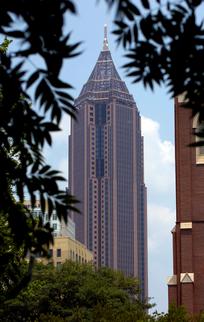One of the biggest emblems of Atlanta's real estate boom became the biggest emblem of its bust recently.
Bank of America Plaza, the South’s tallest skyscraper and an Atlanta skyline icon, was taken back by its lender at a foreclosure auction at the Fulton County Courthouse. The 55-story tower, bought for a record price in 2006 by a California real estate firm, is now metro Atlanta’s priciest repossession.
A lawyer for LNR Partners placed two "credit bids" totaling $250 million. That means it essentially bid not with cash but rather the lender's own interest in the building. LNR represents the lender, a commercial mortgage-backed security owned by investors. The lender is likely to seek a new buyer, who will likely spruce up the tower and try to attract new tenants.
The building's distress stemmed from its last sale at the very height of the real estate boom. The prior owner, BentleyForbes bought the trophy tower for $436 million from Cousins Properties and Bank of America in 2006. Soon after, office vacancies soared and property values and rents plummeted following the economic collapse.
Timeline of a tower
Late 1980s -- C&S Bank and Cousins Properties announce plans for a new C&S headquarters, to be Atlanta’s tallest building, at 600 Peachtree Street.
1991 -- C&S/Sovran is acquired by Charlotte-based NCNB and becomes NationsBank, a precursor to Bank of America.
1992 – The 55-story, more than 1,000-foot building opens as NationsBank Plaza.
1999 – The tower’s name officially changes to Bank of America Plaza after NationsBank acquires Bank of America and takes its name.
2006 – California real estate firm BentleyForbes buys Bank of America Plaza from Bank of America and Cousins Properties for an Atlanta-record $436 million.
2011 – Fitch Ratings issues a report stating Bank of America Plaza is in “imminent default” and a special servicer has been brought in to help work out the troubled debt.
2012 – Bank of America Plaza is foreclosed.
An executive with BentleyForbes said in a statement the firm worked with LNR “for more than a year to identify a viable way forward,” and that transferring control to LNR and the bond holders was the best way forward.
The 1,023-ft tower is a garnet-hued obelisk when the sunset plays off its Napoleon red granite façade. Its 50-ton spire is splashed with 23-karat gold leaf.
The building was planned as the headquarters of C&S Bank in the late 1980s. It was later renamed for successors NationsBank and ultimately Bank of America.
The tower may not be the last signature office or retail complex to change owners. Delinquency rates for commercial mortgage backed securities, or CMBS, just one type of loan for commercial properties, remains near all-time highs in metro Atlanta, according to real estate research firm Trepp.
Bank of America Plaza By the Numbers
23 – The 50-ton spire at the top of Bank of America Plaza is covered in 23-karat gold leaf
55—Floors in the building
1,023 – Bank of America Plaza is 1,023 feet tall.
1.28 million – The total square footage of Bank of America Plaza
Architect: Kevin Roche, John Dinkeloo and Associates
A total of $2.54 billion in CMBS loans, or 20% of the value of all such loans, were past-due in metro Atlanta in January, according to Trepp. The delinquency figure nationwide was 9.52%.
Borrowers have struggled to refinance given falling values and trouble filling vacancies. Major banks and institutional investors also lent on commercial property, but CMBS loans, which typically make higher leveraged loans at high interest rates, became popular last decade. Their use peaked in 2007. Many CMBS loans come due in five years, making 2012 a feared year.
“I think unfortunately we’re only in about the third or fourth inning," said Henry Lorber, an expert in distressed real estate and a managing director at Atlanta-based Hays Financial Consulting.
Big-name tenants filled Bank of America Plaza when BentleyForbes bought it. But the owners soon had to grapple with the Great Recession, corporate cutbacks in office space and a glut of competing new space in Midtown and Buckhead. Ernst & Young left a few years ago and law firm Troutman Sanders and Bank of America reduced their space. Law firm Paul Hastings also is leaving for another building. In metro Atlanta, vacancy remained near record highs in the third quarter 2011 at 16.9%, according to CoStar Group, with rents at $18.36 per square foot, down from $20.28 in 2008.
Gil Burstiner, commercial real estate partner at the law firm of Hartman Simons, said the ordeal will help reset market prices for real estate, and the eventual new owner will likely set rental rates at a new or near the bottom and improve the facilities to lure tenants. BD+C
Related Stories
Museums | Aug 11, 2010
Design guidelines for museums, archives, and art storage facilities
This column diagnoses the three most common moisture challenges with museums, archives, and art storage facilities and provides design guidance on how to avoid them.
| Aug 11, 2010
Broadway-style theater headed to Kentucky
One of Kentucky's largest performing arts venues should open in 2011—that's when construction is expected to wrap up on Eastern Kentucky University's Business & Technology Center for Performing Arts. The 93,000-sf Broadway-caliber theater will seat 2,000 audience members and have a 60×24-foot stage proscenium and a fly loft.
| Aug 11, 2010
Citizenship building in Texas targets LEED Silver
The Department of Homeland Security's new U.S. Citizenship and Immigration Services facility in Irving, Texas, was designed by 4240 Architecture and developed by JDL Castle Corporation. The focal point of the two-story, 56,000-sf building is the double-height, glass-walled Ceremony Room where new citizens take the oath.
| Aug 11, 2010
Carpenters' union helping build its own headquarters
The New England Regional Council of Carpenters headquarters in Dorchester, Mass., is taking shape within a 1940s industrial building. The Building Team of ADD Inc., RDK Engineers, Suffolk Construction, and the carpenters' Joint Apprenticeship Training Committee, is giving the old facility a modern makeover by converting the existing two-story structure into a three-story, 75,000-sf, LEED-certif...
| Aug 11, 2010
Utah research facility reflects Native American architecture
A $130 million research facility is being built at University of Utah's Salt Lake City campus. The James L. Sorenson Molecular Biotechnology Building—a USTAR Innovation Center—is being designed by the Atlanta office of Lord Aeck & Sargent, in association with Salt-Lake City-based Architectural Nexus.
| Aug 11, 2010
San Bernardino health center doubles in size
Temecula, Calif.-based EDGE was awarded the contract for California State University San Bernardino's health center renovation and expansion. The two-phase, $4 million project was designed by RSK Associates, San Francisco, and includes an 11,000-sf, tilt-up concrete expansion—which doubles the size of the facility—and site and infrastructure work.
| Aug 11, 2010
Goettsch Partners wins design competition for Soochow Securities HQ in China
Chicago-based Goettsch Partners has been selected to design the Soochow Securities Headquarters, the new office and stock exchange building for Soochow Securities Co. Ltd. The 21-story, 441,300-sf project includes 344,400 sf of office space, an 86,100-sf stock exchange, classrooms, and underground parking.
| Aug 11, 2010
New hospital expands Idaho healthcare options
Ascension Group Architects, Arlington, Texas, is designing a $150 million replacement hospital for Portneuf Medical Center in Pocatello, Idaho. An existing facility will be renovated as part of the project. The new six-story, 320-000-sf complex will house 187 beds, along with an intensive care unit, a cardiovascular care unit, pediatrics, psychiatry, surgical suites, rehabilitation clinic, and ...
| Aug 11, 2010
Colonnade fixes setback problem in Brooklyn condo project
The New York firm Scarano Architects was brought in by the developers of Olive Park condominiums in the Williamsburg section of Brooklyn to bring the facility up to code after frame out was completed. The architects designed colonnades along the building's perimeter to create the 15-foot setback required by the New York City Planning Commission.








